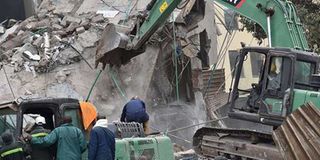Why buildings must not go down with law

Demolition at Ukay Centre in Nairobi on August 10, 2018. When there is a building on riparian land, many of us want to see blood, immediate justice, to destroy it, blow it up! But democracy does not work like that. PHOTO | FILE | NATION MEDIA GROUP
What you need to know:
Mr Kenyatta should send out a strong message that no one will be subjected to mob justice in a civilised society like ours.
Whoever feels aggrieved by a demolition notice, for example, must be allowed a fair chance to argue his or her case before a court of law.
- Big investors are particularly sensitive about how a country’s justice system handles commercial disputes.
There is a lot to be excited about the ongoing demolition of buildings on riparian land and road reserves.
No doubt, it will help slow down the runaway impunity in Kenya that has for many years seen greedy individuals, including government officials, grab public utilities for private gain while putting the lives of communities in danger.
Uncontrolled property development on Nairobi river banks, for instance, has been linked to the flooding and the drainage problems experienced in many residential areas whenever it rains heavily.
LONG OVERDUE
A curious engineering manoeuvre on the city’s Outering Road, a major link to Jomo Kenyatta International Airport, to accommodate a commercial complex said to be on the road reserve is exposing motorists to the risk of traffic accidents every day.
Indeed, the demolitions were long overdue, given that the likes of Kenya’s Nobel Peace Laureate, the late environmentalist Wangari Maathai, warned against the senseless grabbing of riparian land for property development about two decades ago.
It is a testament to Kenya’s legendary impunity that multi-billion shilling shopping malls and office complexes have continued to rise in some of these places.
MOB JUSTICE
It is the kind of impunity that President Uhuru Kenyatta alluded to in his remarks last week about friends calling him to try to have him stop the demolitions.
The statement was delivered with the emphatic tone of a man who understands he is on the right side of history and has the whole nation behind him on the matter. But even as he intensifies the war against impunity, the President must resist any temptations to demolish the rule of law in the process.
Whatever the public might think about the buildings’ owners, Mr Kenyatta should send out a strong message that no one will be subjected to mob justice in a civilised society like ours.
Whoever feels aggrieved by a demolition notice, for example, must be allowed a fair chance to argue his or her case before a court of law.
INVESTOR FAITH
Big investors, like the ones who would normally put their money in shopping malls and office complexes in Nairobi’s Westlands area, are particularly sensitive about how a country’s justice system handles commercial disputes.
In a nutshell, shutting the door on justice will shatter investor faith as well.
And it will most likely open the door for extortion and blackmail by people within the law enforcement agencies, who see the demolitions as an opportunity to enrich themselves, not fight impunity.
With the habits of an average Kenyan law enforcement person pretty much the same, even owners of legal buildings might not have peace.




